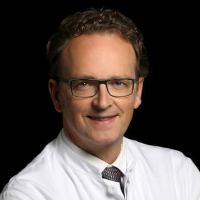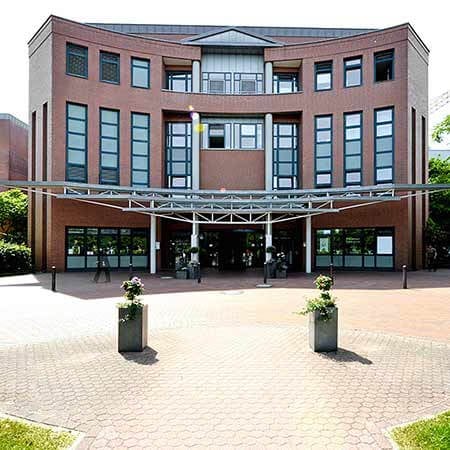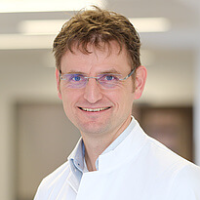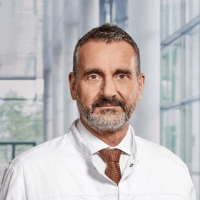Cardiosurgery in Germany – treatment in the Best Hospitals
Here you will find most technologically advanced cardiosurgical hospitals in Germany
Focus of treatment:
- Anomalous pulmonary venous connection
- Aortic coarctation
- Aortic valve insufficiency (avi)
- Aortic valve stenosis
- Atrial septal defect (ASD)
- Atrioventricular valve dysplasia (avd)
- Congenital and acquired heart defects
- Left ventricular aneurysm
- Mitral valve insufficiency (prolapse)
- Mitral valve stenosis
- Patent foramen ovale (PFO)
- Pulmonary valve insufficiency
- Pulmonary valve stenosis
- Tetralogy of fallot (ToF)
- Tricuspid valve disease
- Tricuspid valve stenosis
- Ventricular septal defect (VSD) Show more

Department of Cardiothoracic Surgery
According to the Focus magazine, the Department of Cardiothoracic Surgery ranks among the top German medical facilities specializing in the surgical treatment of diseases of the cardiovascular system and lung cancer! The department offers the full range of surgical services for the treatment of diseases of the cardiovascular sys





Department of Cardiac Surgery
The Department of Cardiac Surgery provides a full range of surgical treatment in its area of specialization. Special emphasis is placed on heart valve repair and replacement surgery, coronary artery bypass grafting, thoracic aortic surgery, adult congenital and acquired heart disease surgery, pacemaker and defibrillator implan

Department of Cardiothoracic Surgery and Vascular Surgery
The Department of Cardiothoracic Surgery and Vascular Surgery provides effective surgical treatment for diseases of the heart, respiratory system, and blood vessels. The team of cardiac surgeons operates on patients with heart valve pathologies, coronary heart disease, heart failure, and heart rhythm disturbances. In the field o





Cost of surgery for congenital and acquired heart defects starts from €24,151. You can find other prices for treatment in Germany on the Booking Health website.
| 1 | University Hospital Rechts der Isar Munich |
| 2 | University Hospital of Ludwig Maximilian University of Munich |
| 3 | Clinic of Advanced Biological Medicine Frankfurt-am-Main |
| 4 | University Hospital Frankfurt-am-Main |
| 5 | HELIOS Clinic Krefeld |
The branch of medicine that aims to study and treat the human heart and blood vessels is called cardiology. One of its directions is cardiosurgery, which uses surgery to treat heart diseases.
Content
- Risk factors for heart diseases development
- Most common heart diseases
- Treatment of heart diseases with surgery in Germany
- Where I can do heart surgery in Germany?
- The cost of treatment in Germany with cardiac surgery
- How can I do heart surgery in Germany?
Risk factors for heart diseases development
Cardiovascular diseases, oncological diseases, diabetes mellitus, and respiratory diseases are in the first place among the most common and dangerous diseases of the 21st century. Nevertheless, the causative factors that lead to the development of such diseases may be modified in youth. Unfavorable processes occurring in the body, the so-called risk factors, can and should be corrected.
Heart diseases occur primarily in people who smoke, eat food poor in vitamins and minerals, and exercise little. Of course, hereditary predisposition also plays a role. Nevertheless, development of cardiovascular diseases can be postponed. To do this, people need to know the mechanisms that trigger cardiovascular diseases.
The fact is that the heart of a healthy person can tolerate significant physical activity. So, for the normal functioning of the cardiovascular system, a person should walk at least 6 km daily. Most of us, unfortunately, do not have time for walks, and neither do we have a desire. As a result, the muscles of the heart and blood vessels become weak and can hardly cope with any negative physical factors that affect the body. Besides, the modern lifestyle is associated mainly with office work, which often leads to the excessive body mass and obesity. In addition, stressful situations are often present in our lives, both at work and at home. Also, in obese people, the risk of developing atherosclerosis increases. In atherosclerosis the walls of blood vessels are covered with cholesterol. The atherosclerotic plaques lead to blockage of the vascular lumen and a certain area of the heart muscle becomes deprived of normal blood supply and dies. The result is a heart attack. Atherosclerosis of the coronary arteries is one of the main causes of heart diseases.
Smoking accelerates the formation of blood clots since nicotine causes a spasm of the coronary vessels feeding the heart and stimulates blood clotting. In addition, nicotine increases the accumulation of cholesterol in the vascular wall. As a result, all this ends with the development of ischemic heart disease (IHD), often leading to the myocardial infarction.
A balanced diet plays an important role as well. Fatty, spicy, and salty food not only affects negatively the body mass and appearance but also reduces the elasticity of blood vessels. An excess of salt in food promotes fluid retention, creates an increased load on blood vessels and the heart. Under such circumstances kidneys can not cope with the excretion of excess fluid. Unfortunately, strong tea and coffee, and alcohol also harm the cardiovascular system.
Recently, doctors have recommended the population to assess the content of cholesterol in the blood during check-up examinations. Cholesterol is formed in the liver, and also comes with food of animal origin. It should be remembered that high blood cholesterol levels are dangerous for blood vessels.
In the blood, cholesterol is represented by lipoprotein fractions. "Bad" cholesterol (low-density lipoproteins) is deposited on the walls of blood vessels and forms atherosclerotic plaques that impede blood flow. "Good" cholesterol (high-density lipoproteins), on the other hand, prevent the formation of atherosclerotic plaques.
Most common heart diseases
Heart diseases are classified into the following types:
- Rhythm and conduction disturbances. Diseases associated with rhythm and conduction disturbances include cardiac arrhythmia, bundle branch block, atrial fibrillation, etc.
- Inflammatory heart diseases. Inflammatory heart diseases include endocarditis, myocarditis, and pericarditis. All of these diseases are associated with inflammation of different parts of the heart: the inner membrane – the endocardium, the heart muscle – the myocardium, and the connective membrane of the heart – the pericardium.
- Valve defects. Valve defects are divided into two subtypes: congenital and acquired ones. Congenital valve defects develop due to the genetic disorders. Acquired valve defects are most often associated with infections or autoimmune reactions.
- Hypertensive heart disease. Hypertensive heart disease is associated with persistent high blood pressure.
- Ischemic heart disease. This disease is associated with a complete or partial decrease in blood flow to the heart muscle. In the first case, the patients have a myocardial infarction, in the second case, coronary heart disease develops.
- Damage to the vessels of the heart (cardiosclerosis, coronary heart disease, atherosclerosis).
- Pathological diseases associated with irreversible changes in the work of the heart. For example, cardiac asthma and heart failure lead to hypertrophy of different parts of the heart.
According to statistics, about 7 million people die annually from coronary heart disease, and about 6.5 million people – from a stroke.
In addition to coronary artery disease and stroke, the list of the most common diseases includes:
- Peripheral arterial disease
- Rheumatic heart disease
- Deep vein thrombosis and pulmonary embolism
Treatment of heart diseases with surgery in Germany
Heart surgery can be of two types: open heart surgery and closed heart surgery.
The first type is open surgery, or thoracotomy. Thoracotomy is the opening of the chest. This type of heart surgery was previously considered the main one since it was not possible to create access to the heart and coronary vessels without opening the chest. This type of heart surgery is associated with high risks due to the dissection of the sternum and significant blood loss. Even successful open heart surgery can have long-term adverse consequences, in particular, chronic pain syndrome associated with damage to the intercostal nerves (post-thoracotomy pain syndrome develops in up to 80% of patients). Nevertheless, open heart surgery is currently performed in cases when it is impossible to perform alternative, closed heart surgery. An example is heart transplantation for which thoracotomy is required.
Closed heart surgery is called thoracoscopic. This heart surgery is performed by the endoscopic method using an endoscopic system with a mini-manipulator and a mini-camera, which are inserted through small punctures in the chest and moved to the target area of the heart or coronary system. This method allows doctors to minimize surgical trauma, reduce intraoperative blood loss, and avoid the development of pain in the postoperative period. Currently, this method, along with endovascular heart surgery, is considered an international standard for the surgical treatment of cardiac pathologies. In the endovascular heart surgery an endoscope is inserted into a large femoral or brachial artery and brought to the heart through the vascular system. Thanks to excellent precision of thoracoscopic manipulations, closed heart surgery is often superior to the open method. Another advantage is the quick recovery of the patients. Unlike thoracotomy, the procedure itself does not take much time, so the period of stay in the medical center is also much shorter (unlike open heart surgery). Patients usually feel relief immediately after the surgery, and in 2-3 days they can return home and lead a normal life with minimal restrictions.
Heart surgery may be performed in different clinical situations. It often helps to correct some problems that cannot be eliminated with conservative treatment or medicines intake. The most common types of heart surgeries in medicine are as follows.
- Coronary artery bypass grafting (CABG).
This is the heart surgery that is performed in cases when the stenosis of a coronary vessel is significant and the blood flow through it is so low that the part of the heart supplied by this vessel is in a state of ischemia. The essence of the coronary artery bypass surgery is that with the help of a section of the donor vessel (usually harvested from another region of the patient's body), a bypass of the coronary affected vessel is created. The new vessel has an ideal permeability, blood freely flows through it to the heart, and ischemia can be eliminated.
- Heart valve replacement.
The medical procedure is indicated in cases when one of the heart valves is damaged and not coping with its functions, due to which the heart works with low efficiency. The affected valve is replaced by a valve made of artificial high-tech materials or biological tissues.
- Transcatheter aortic valve replacement.
Transcatheter aortic valve replacement is a minimally invasive heart procedure to replace a narrowed aortic valve that fails to open and pass through arterial blood properly (aortic valve stenosis).
- Correction of congenital coronary malformations.
Currently, these operations are performed in early childhood, sometimes even at the stage when the child is still in the womb, or immediately after birth. This early medical procedure demonstrates excellent results, as it avoids the development of severe heart failure in a child, which is very dangerous at an early age. The use of cardiac surgery technologies in modern medical centers makes it possible to save children who are doomed without such treatment and are not able to survive to adulthood.
- Surgical treatment of cardiac arrhythmia.
Currently, the most effective treatment for severe arrhythmias in medicine is the implantation of a pacemaker. A pacemaker is a device that artificially maintains the regular heart rhythm. Such devices have been used in the department of cardiac surgery since the second half of the 20th century. Now their implantation is considered a routine method in medicine abroad. The technique of intervention that is proven on the international level allows minimizing surgical risks and extending life for many years. Two types of pacemakers are used currently, i.e. pacemakers themselves and defibrillators, or their combination.
- Stenting.
Along with coronary artery bypass grafting, this is one of the main surgical methods in medicine for treating coronary artery disease. It is used for the treatment of the same pathologies as coronary artery bypass grafting, but in cases when it is still possible to restore the patency of the affected vessel. The essence of this heart surgery is inserting an artificial stent into the place of stenosis (the narrowing of the vessel). After implantation, a stent prevents the walls of the vessel from re-narrowing. Modern stents may be made of bioresorbable material, which dissolves gradually and slowly, as vascular patency is restored. This avoids the complications that were often encountered before, when stents were implanted permanently, gradually becoming a new threat factor for patients.
Where I can do heart surgery in Germany?
Medical tourism is becoming more and more popular these days, as medicine in Germany often ensures a much better quality of cardiac surgery.
The following medical centers show the best success rates in heart surgery in Germany:
- University Hospital Essen
- University Hospital Oldenburg
- University Hospital Ulm
- University Hospital Frankfurt am Main
- University Hospital Tuebingen
You can find more information about the German and European hospitals on the Booking Health website.
The cost of treatment in Germany with cardiac surgery
The prices in hospitals on the Booking Health website are relatively low. With Booking Health, you can undergo treatment in Germany, including heart surgery, at an affordable price.
The cost of treatment in Germany varies, as the prices depend on the medical center, the specifics of the disease, and the complexity of its treatment.
For example, the cost of treatment with cardiac catheterization and coronary bypass surgery in Germany starts at 20,819 EUR, while the cost of treatment with catheter cardiac ablation in Germany starts at 14,686 EUR.
You might want to consider the prices of possible additional procedures and follow-up care. Therefore, the ultimate cost of treatment in European hospitals may differ from the initial price.
To find out the information on the overall cost of treatment in Germany, you may contact us by leaving the request on the Booking Health website.
How can I do heart surgery in Germany?
It is not easy to self-organize any treatment abroad. It requires certain knowledge and expertise. Thus, it is safer, easier, and less stressful to use the services of a medical tourism agency.
As the largest and most transparent medical tourism agency in the world, Booking Health has up-to-date information about cardiac surgery in the best German and European hospitals. We will help you select the right medical center taking into account your wishes for treatment.
We want to help you and take on all the troubles. You can be free of unnecessary stress, while Booking Health takes care of all organizational issues regarding the treatment in Germany. Our services are aimed at safe and successful treatment of international patients.
Medical tourism can be easy! All you need to do is to leave a request on the Booking Health website, and our manager will contact you shortly.
Authors:
This article was edited by medical experts, board-certified doctors Dr. Nadezhda Ivanisova, and Dr. Bohdan Mykhalniuk. For the treatment of the conditions referred to in the article, you must consult a doctor; the information in the article is not intended for self-medication!
Our editorial policy, which details our commitment to accuracy and transparency, is available here. Click this link to review our policies.

